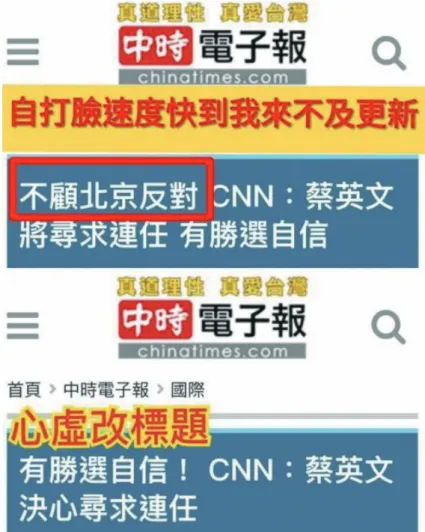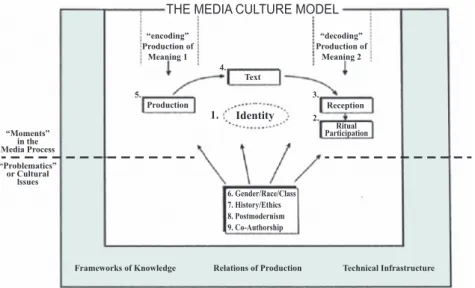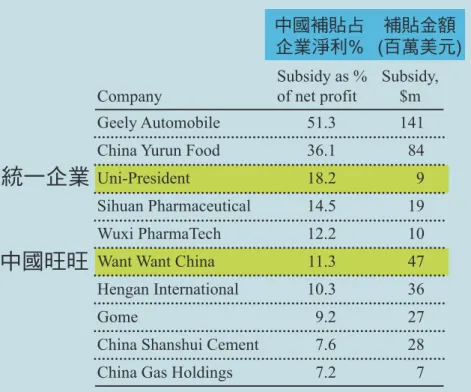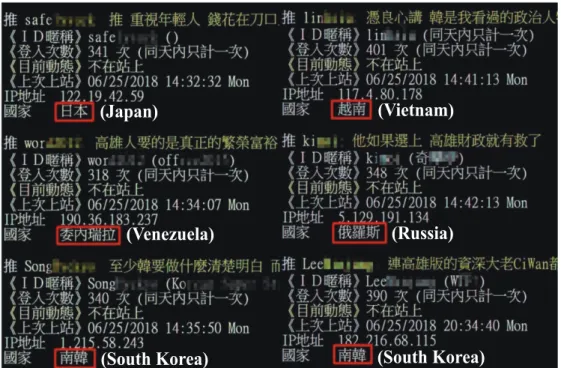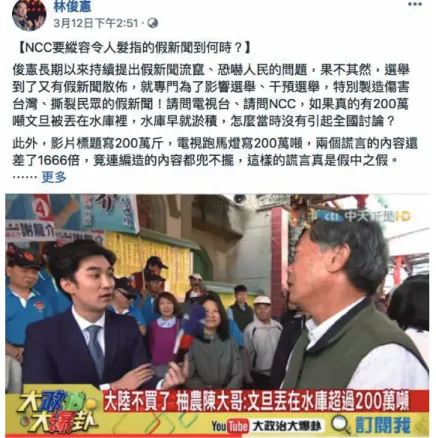The Influence of China’s Sharp Power
on Taiwan’s Media
Yu-yen Chien
Radio Hostess & Political Commentator, Doctorate Student, Institute of Development Studies, National Chengchi University
Abstract
Unlike the “soft power” concept introduced by Joseph Ney, China’s “sharp power” incorporated into its international communication layout plan has influenced Taiwan’s traditional media through various means, including persuasion, incitement, buying, coercion, and false messages; thus achieving its intent to manipulate and influence public opinion in Taiwan. Studies show that, in addition to purchases of media stocks, system operators’ stocks, and news content through product replacement, China also exerts its sharp power using anonymous IP addresses to set the agenda, influence news trends, do news laundering, and get fabricated news into Taiwan media. Given the fact that many newspapers in Taiwan demand a certain click through rate (CRT) generated from their reporters’ articles, China’s manipulation of media would be conducive to Chinese propaganda by further suppressing Taiwan’s consciousness, which substantially could impact elections in Taiwan, Taiwanese people’s national identity, and their feelings about China.
Keywords: Sharp Power, Fake News, Great Layout Plan of (China’s) International
Com-munication, Shaping of Public Opinion, Click Through Rate (CRT)
I. Should One Consider Beijing’s Feelings when Writing News on Taiwan?
On February 20, 2019, Taiwanese media reported that President Tsai Ing-wen had told CNN that she would run for re-election in 2020. Although the people of Taiwan have directly elected presidents in six elections over the past two decades, the online headline of one Taiwanese outlet read: “Despite Beijing’s Opposition, Tsai Ing-wen Will Seek Re-election, Confident of Victory.” The report sparked widespread debate. Taiwan has seen three transitions of power and does not need the approval of
the People’s Republic of China for its president to run for re-election. It is a matter for Taiwan. Yet, the paper described Tsai’s announcement as a move “despite Beijing’s opposition.” Although the headline was soon deleted (see Figure 1), debate continued to rage, demonstrating the emergence of Chinese influence over Taiwanese media.
Figure 1. Taipei Media Concerned with Beijing’s Attitude?
Note: The original headline on ChinaTimes.com (in red box) reads: “Despite Opposition from Beijing….” In the updated headline below, this has been removed.
Source: 〈稱小英「不顧北京反對」參選 媒體改標了〉, Liberty Times, February 19, 2019, <https://www.google.com.tw/amp/s/m.ltn.com.tw/amp/news/politics/breakingnews/2703572>.
To what extent - if at all - should Beijing’s feelings be considered when writing news? When Lo Wen-jia, Secretary-General of the Democratic Progressive Party (DPP), welcomed a possible visit to Taiwan by the Dalai Lama, the same outlet
published a piece in its News Perspective column, warning “Lo Wen-jia’s Move Would Provoke Both Sides of Strait.”1The article criticized the DPP and suggested the party
would be unwise in elections to play the “war” and “Dalai Lama” cards. The piece appeared to criticize the DPP for playing the Dalai Lama card “despite Beijing’s opposition.” Similar pieces have become increasingly common in Taiwanese media, conveying the same perspective as that held by Beijing. TV pundit Huang Chih-hsien said on a CTI TV program that “Taiwan is essentially dependent on China for living……it is everyone’s duty to pursue unification.”2The implied rebuke of Taiwan’s public opinion
provoked discussion. When did media personalities change and feel the need to seek Beijing’s attitude on everything? Why should one have to be overcautious, indecisive, and worried about whether China is happy or not?
At a time when the Legislative Yuan was discussing the the Ministry of National Defense’s request for procurement of U.S. arms, the front page of the China Times on March 8 read: “U.S. Walks All Over Taiwan, Forcing Us to Buy Weapons at Sky-High Prices.” The headline drew a stern response from the Air Force Command Headquarters. The China Times claimed the procurement request was “intended to help Tsai Ing-wen pay a visit to the U.S. later this year.” A statement from the Air Force rejected the claim that F-16V fighters were overpriced. The statement also rejected any connection between the procurement request and the next presidential election in Taiwan, adding that the media report was “a blow to military morale.”3
Similar cases occur in Taiwan every day, prompting talk of the media landscape under “One Country, Two Systems” that has been widely discussed in Hong Kong. It has been more than ten years since conflict first emerged between Hong Kong and Beijing over press freedom versus Beijing’s news perspective, and press freedom in
Tseng Yi-ping, “Playing Dalai Lama Card to Provoke Both Sides of Strait, Pan-Green Camp Miscalculates,” China Times, March 8, 2019, <https://www.chinatimes.com/newspapers/ 20190308000641-260102>.
CTI-TV, “2019.03.06 Late Night Punch,” March 6, 2019, Youtube, <https://www.youtube.com/ watch?v=7ZTgWjZYa6Y>.
陳宇義, 〈中時誣天價買舊武器 空軍痛斥:以誣衊方式誤導社會〉, Taro News, March 8, 2019, <https://taronews.tw/2019/03/08/275173/>.
Hong Kong since has been eroded considerably. A media civil war now is playing out in Taiwan, where some outlets support freedom of speech in a democratic system, while others back unification with China and Xi Jinping’s “Five Points”4for peaceful
cross-strait development. Today’s Taiwan is completely different from Hong Kong. Furthermore, Taiwan has never been ruled by Beijing. Why then are so many reports conveying Beijing’s perspective through Taiwan’s TV and print media? The answer is that China’s sharp power has had a profound impact on Taiwan’s media.
II. China’s Sharp Power Have Influenced Taiwan through Various
Approaches
The International Forum for Democratic Studies at the National Endowment for Democracy published a report in December 2017 titled “Sharp Power: Rising Authoritarian Influence.” Through observations by scholars from Latin America and Central Europe, the report analyzed how China and Russia have increased their influence in Peru, Argentina, Poland, and Slovakia. China’s “sharp power” raised discussion at that time.5The Economist said in a cover story that China’s sharp power
contains a series of interlocking components: “subversion, bullying and pressure, which combine to promote self-censorship.” “Soft power harnesses the allure of culture and values to add to a country’s strength; sharp power helps authoritarian regimes coerce and manipulate opinion abroad.”6
Examples of this sharp power in operation include Sri Lanka handing over a port to China under the Belt and Road Initiative (BRI) and three Australian publishers withdrawing plans to publish a book alleging widespread Chinese government influence over Australian institutions in fear of retaliation from Beijing.7Testifying at a Senate
Chung-sheng Chen, 〈《告台灣同胞書》40 周年 習近平講話全文〉, Newtalk, January 2, 2019, <https://newtalk.tw/news/view/2019-01-02/188674>.
National Endowment for Democracy, “Sharp Power: Rising Authoritarian Influence,” December 5, 2017, pp. 6-156, National Endowment for Democracy, <https://www.ned.org/wp-content/up-loads/2017/12/Sharp-Power-Rising-Authoritarian-Influence-Full-Report.pdf>.
The Economist, “What to do about China’s ‘sharp power,’” December 14, 2017, The Economist, <https://www.economist.com/leaders/2017/12/14/what-to-do-about-chinas-sharp-power>. Frances Mao, “‘China influence’ book proves divisive in Australia debate,” BBC News, March 8, 2018, <https://www.bbc.com/news/world-australia-43193146>.
hearing titled “The Long Arm of China: Exporting Authoritarianism With Chinese Characteristics,” Shanthi Kalathil, director of the International Forum for Democratic Studies at the National Endowment for Democracy, said China has spent tens of billions of dollars to shape norms, narratives, and attitudes in other countries. The exertion of influence behind those Chinese activities should be categorized as sharp power instead of soft power.8
Spanish journalist Juan Pablo Cardenal maintains that China has expanded its influence in Latin America in three areas, namely the media, academia, and culture. China exerts its sharp power overseas through three approaches: the provision of sponsored trips for Chinese study and exchange groups; the establishment of strategic organizations in foreign countries, such as overseas affiliates of Xinhua News Agency; and a political agenda designed to reduce criticism of China.9
Addressing how China infiltrates Taiwanese media by employing its sharp power, Su Zi-yun, head of the Center for Advanced Technology (CAT) at Tamkang University, believes there are three stages: first, control of TV news stations or their parent companies through stock purchases; second, the entry into distribution channels, namely cable operators, which allows China to block media outlets it deems unfriendly, remove them from cable services, or control all Chinese media; third, influencing the development of TV program content through investments in content production. Su says that, by conveying selected and favorable messages, China has integrated psychological warfare and media warfare into united front tactics to target the audience.10
In Michael R. Real’s analysis of media influence on social culture (see Figure 2), the output of media text, which is the text, photographs, news, and political
Chen Zhishen, “U.S. Congress Holds Hearing on ‘Long Arm of China’ Again to Reinforce Allegation of China’s Sharp Power,” Hong Kong 01, February 4, 2018, <https://www.hk01. com/即時國際/156682/美國國會兩度舉行-中國之長臂-聽證-強化對中國銳實力指控>.
Juan Pablo Cardenal, China’s Silent Army: The Pioneers, Traders, Fixers and Workers Who
Are Remaking the World in Beijing’s Image (New York: Broadway Books, 2014), pp. 1-368.
Guo Yao-rong, “From Incidence of Removal of TV News Network From Cable Services, Look at Trilogy of China’s United Front Work Targeting Media,” Epoch Times, May 8, 2018, <http:// www.epochtimes.com/b5/18/5/8/n10372305.htm>.
commentary carried by media, can have significant social influence in the encoding and decoding process.
THE MEDIA CULTURE MODEL
“encoding” Production of Meaning 1 “decoding” Production of Meaning 2 “Moments” in the Media Process “Problematics” or Cultural lssues 4. Text Production 5. 3. 2. 1. Identity Reception Ritual Participation 6. Gender/Race/Class 7. History/Ethics 8. Postmodernism 9. Co-Authorship
Frameworks of Knowledge Relations of Production Technical Infrastructure
Figure 2. Chapter Sequence and Model for Exploring the Many Aspects of Media Culture
Note: Through its stock ownership in media companies, ownership of cable system operators (which can change their channel lineup), or product placement, China may be able to exert sharp power to influence media content production in Taiwan. China might further influence encoding and decoding in the communication process and, in this way, reshape the culture and values of the era.
Source: Michael R. Real, Exploring Media Culture: A Guide (Thousand oaks: SAGE Publication, 1996), p. xxiii.
China’s sharp power operates through purchases, bribes, rewards, releasing false information, censorship, and propaganda. It uses diverse means to package its infiltration to form a sinister influence, taking advantage of the open character of democratic society to wield strong control over intermediaries’ encoding process to influence readers and listeners to change their identity in the decoding process and cause them to identify with the autocracy it exports. For instance, power is packaged as efficiency, tyranny as making money.
III. From Buying News to Fake News, Comprehensively Infiltrating Taiwan
in four cities and counties on March 16. The by-elections were viewed as a prelude to the 2020 presidential and legislative elections, as well as the result of a series of fake news and online campaigns intended to interfere in Taiwan’s elections. Sunflower Movement leader Lin Fei-fan delivered a public speech for the first time in five years, telling young people that this “is a prelude to Xi Jinping’s ambition to take over Taiwan. The by-elections in these three seats mean a great deal and are a matter of life and death for Taiwan.” Lin said China’s interference in Taiwan’s elections through the spread of fake news, fabricated information, deception, smears, and disinformation as campaign tools cannot be tolerated.11
Elsewhere, Chinese over-the-top (OTT) service provider Tencent Video reportedly plans to enter the Taiwan market in May, having signed a lease on an office in Taipei 101, which is another example of China’s penetration into Taiwanese media. DPP legislator Cheng Yun-peng claims Tencent has close ties to the Chinese government and the Communist Party of China, given that 7,000 of its 30,000-40,000 employees are party members and that private companies in China have party organizations and secretaries in the same way as state-owned enterprises. Cheng said full and open competition does not necessarily represent progress, adding that, if Chinese OTT service providers seek to grab market share in Taiwan with no fear of losing money or no intent to make money, this will affect Taiwanese culture and even the education of the next generation.12
China’s intervention in local media is one of the most important discussions for Taiwan’s society in 2019. Scholar Su Zi-yun says Taiwan is effectively faced with a “One Country, Two Systems” situation when it comes to news coverage. This includes how media ownership, available channels, product replacement, Internet users, Youtubers, and click views may affect media content in Taiwan.
Chang Man-ping, “Endorsing Yu Tien, Lin Fei-fan: This Election is Prelude to Xi Jinping’s Plan To Take Over Taiwan,” UDN Online, March 15, 2019, <https://udn.com/news/story/6656/3700085>. Lu Yent-zu, “China’s Tencent and YOKU Invade Taiwan,” Apple Daily, March 14, 2019, <https://tw.appledaily.com/new/realtime/20190314/1532979/>.
1. The Influence of Chinese Capital on Media Ownership Structure
Claims of the involvement of Chinese capital in purchases of Taiwan media stocks have been around since 2003. Yang Shih-jen, former deputy editor-in-chief of the Economic Daily, wrote a piece revealing the involvement of Chinese capital in 17 Taiwanese media outlets. A number of share dispute cases also have arisen in Taiwan in recent years. The Los Angeles Times reported that U.S. company DMG En-tertainment had acquired Taiwanese TV network EBC for US$600 million (about NT $19.3 billion). There were reports of Chinese capital in the deal although Shih Shih-hao, then chairman of the National Communications Commission (NCC), said the commission would strictly review the involvement of Chinese capital.13Chinese writer
He Qinglian claims 2008 can be seen as a watershed in this kind of stock buying method. Before 2008, a roundabout method was common, relying on the capital of overseas Chinese investing in Taiwanese media. After 2008, Taiwanese businessmen who invested in China and who had close ties to the Chinese government started buying media.14
Chinese author He Qinglian analyzed that this method of buying shareholding rights can be demarcated from 2008. Before 2008, people adopted the method of bypassing to mostly become shareholders in Taiwan media by way of overseas Chinese capital. After 2008, Taiwan businessmen who invested on the mainland and had a close relationship with the Chinese government emerged personally to acquire the media. China’s strategy towards Taiwan following Hu Jintao’s “Enter the Island, Enter the Home, Enter the Heart” took the idea that “buying Taiwan is better than fighting Taiwan.” Taiwan has four main daily newspapers: Apple Daily, Liberty Times, United Daily News, and China Times. The boss of the Want Want Group, Tsai Eng-meng, bought the China Times in November 2008. In May 2009, Tsai went on to buy TV stations CTi and CTV, eventually acquiring a media group containing the print titles China Times, Commercial Times and China Times Weekly, the TV stations CTV and CTi for around NT$20.4 billion. He then bought a 49% stake in Hong Kong’s Asia
Wen Kuei-hsiang, “NCC: Chinese Capital Cannot Invest in Taiwan Media,” Taiwan News, November 23, 2015, <https://www.taiwannews.com.tw/ch/news/2840735>.
Television, which was losing billions of Hong Kong dollars. Common Wealth Magazine in February 2009 (Issue 416) reported that Tsai Eng-meng had told the then head of China’s Taiwan Affairs Office, Wang Yi, that he wanted to “use the power of media to push forward the development of cross-Strait relations.” In response, Wang reportedly promised the full support of the Taiwan Affairs Office “if the group has any needs in the future.”
In replying to a question by legislator Kuan Bi-ling, the NCC referred to Article 73 of the Act Governing Relations Between the People of the Taiwan Area and the Mainland Area, which states, “Unless permitted by the competent authorities, any individual, juristic person, organization, or other institution of the Mainland Area, or any company it invests in any third area may not engage in any investment activity in the Taiwan Area.” The Ministry of Economic Affairs also confirmed that wireless broadcasting was not listed as within the scope of permissible investment areas for persons from Mainland China. In the case of the sales of CTV and BCC, the transferees were Taiwanese juristic persons and individuals. For the sake of diligence, views were sought from the Ministry of Culture, Mainland Affairs Council to check for contravention of the interpretation of the law, and the sales were finally approved. In other words, because Tsai Eng-meng is Taiwanese, there was no issue regarding Chinese investment and the deal was passed.
Nevertheless, the April 2013 edition of The Economist published an article titled “Perverse advantage - A new book lays out the scale of China’s industrial subsidies,” which contained excerpts of the book Subsidies to Chinese Industry by Usha Haley and George Haley. The book revealed that Want Want China Holdings Limited received a subsidy of US$47 million (NT$1.4 billion), accounting for 11.3% of its annual net profit, from the Chinese government. This prompted speculation in Taiwan as to whether the Chinese government had provided the money to help Want Want buy up Taiwanese media. The Economist published details of China’s subsidies (see Figure 3).
ಛΙӌཾ
ϛܼܼ
ϛ၄ຮћ ӌཾցĦ ၄ຮߜ ĩԻछϯĪ Geely Automobile China Yurun Food Uni-PresidentSihuan Pharmaceutical Wuxi PharmaTech Want Want China Hengan International Gome
China Shanshui Cement China Gas Holdings
51.3 36.1 18.2 14.5 12.2 11.3 10.3 9.2 7.6 7.2 141 84 9 19 10 47 36 27 28 7 Company Subsidy as % of net profit Subsidy, $m
Figure 3. The “Private” Sector: Subsides for Selected Private-Sector Chinese Firms 2011
Note: China’s subsidies for private companies that buy up Taiwanese media.
Source: The Economist, “China’s Economy Perverse Advantage: A new book lays out the scale of China’s industrial subsidies,” April 27, 2013, Breaking News on China Subsidies, <http://www.chinasubsidies.com/economist-review.pdf>.
China Times subsequently hit back with an editorial titled “Which Country’s Government Does Not Subsidize Enterprises? Please Have Su (Tseng-chang) Stop Smearing Want Want”; 15 in doing so the paper indirectly confirmed that its parent
company did indeed receive the subsidy. Through this model, China can legally and directly influence Taiwan media.
Recently, the shift in the shareholding of Taiwan’s media has frequently triggered discussions in the society. The change in the shareholding of the “three China” group
“Which Country’s Government Does Not Subsidize Enterprises? Please Have Su (Tseng-chang) Stop Smearing Want Want,” China Times, May 28, 2013, <https://www.chinatimes.com/new-spapers/20130508000649-260109>.
has exceeded 10 years. The situation is clear that, in recent years, the TVBS merger and acquisition, the ETTV stockholding, and others are the cases that elicited discussion. From the reply of NCC, it shows that the Democratic Progressive Party Government believes that Taiwan is a country of democratic rule of law and can only respond negatively in accordance with the act governing the relations between the people on the two sides of the Taiwan Strait and the law on wireless radio and television broadcast. This has also let people like William Stanton, former director of the Taipei Office of the American Institute in Taiwan, repeatedly express their understanding and worries about the serious problems of Taiwan’s media, and publicly suggest that Taiwan should enact a law to ban media persons from fishing for benefits in China and speaking for China in an attempt to influence U.S.-China-Taiwan relations.16
2. Chinese Capital is Suspected of Intervening in the Shareholding Structure of “Broadcast System Operators”
Apart from media content, Taiwan’s television information must go through “broadcast system operators” to enter the televisions of all homes. In the recent few years, there has been discussion on Chinese capital intervening in the broadcast system operators and on KBRO (凱擘), China Network System, TWM Broadband (臺灣大寬 頻), TBC (臺灣寬頻通訊), and Taiwan Optical Platform, which control nearly 70 percent of Taiwan’s users in cable television systems. Of these, KBRO and TWM Broadband, headed by Fubon Group’s Daniel Tsai (35%); China Network System (23.57%), which Far Eastone Telecommunications is waiting to acquire; and other broadcast system operators, such as Taiwan Broadband, Taiwan Infrastructure Technology Company, and independent broadcast system operators (about 30%) in combination with ERA TV Group (年代電視) chairman Tai-sheng Lien.17
In addition, at a press conference in the end of 2018, legislator Tuan Yi-kang
Chang Jui-chen, “Taiwan Should Ban Political Media from Fishing for Benefits in China,”
Liberty Times, January 27, 2019, <https://news.ltn.com.tw/news/politics/paper/1264295>.
Li Hsin & Cheng Hui-wen, “Do You Know that Taiwan Media Will Soon be Controlled by Three People?- Talking About Media Monopoly from Media Mergers and Acquisitions,” October 16, 2015, BuzzOrange, <https://buzzorange.com/2015/10/16/the-core-problem-of-tw-media/>.
attacked the merger and acquisition of broadcast system operator China Network System with the intervention of Hungtai Group with NT$8 billion because it had the participation of Chinese capital on its back. Tuan Yi-kang further named a foundation under the flag of Alibaba for intervening in the transaction of Taiwan’s broadcast system operators.
Nevertheless, the legislator’s question did not affect the refutation of the China Network System case. The NCC still approved the acquisition in the end. NCC said that the investment screening committee and national security unit replied that their evaluation results showed that there was no “Chinese capital.”18 Ever since the “three
China” cases, faced with the evidence of the outside circle, the NCC has consistently used the reply of national security unit or investment screening committee or Ministry of Culture to evade its responsibilities.
3. Internet Strongly Leads the Direction of Public Opinion and News Laundering
Product placement is a way that one can “buy” news in Taiwan. Nevertheless, shaping of public opinion and news “laundering” also has been conducted through the strong Internet influence. Thus, diverse methods are employed to interfere with the orientation of news stories, buying traffic, or through the so-called “Internet water army” or mass click rates, thus shaping public discourse to achieve what scholar Michael Real calls a new social identity.
In terms of product placement, legislators have noted instances like “the propaganda plan for the visit of the governor of Fujian Province to Taiwan,” criticizing the Fujian governor for spending money to buy “news” when visiting Taiwan. News media scholar Chang Chin-hwa says that, when heads of China’s provinces and cities come to Taiwan, apart from taking out pages in print media for publicity, Want Want China Times not only sells the news but also helps other outlets do likewise. Having colluded in its business plans, it then allocates parts to other outlets, receiving money to pass off its coverage as news reporting, cheating the reader.19 Chang Chin-hwa criticizes
Lin Shih-hsiang, “Tuan Yi-kang Discloses Chinese Capital Involvement,” SETN, December 4, 2018, <https://www.setn.com/News.aspx?NewsID=465843>.
Tsen-hsi Wu, “Mainland provinces buying Taiwanese media embedded marketing triggers backlash,” Epoch Times, April 23, 2012, <http://www.epochtimes.com/b5/12/4/23/n3572494.htm>.
this as trampling the professionalism of news journalism, and this, together with cross-Strait military confrontation, is intended to do harm to Taiwan’s democratic system. A senior figure in newspaper journalism, D, admitted frankly that, in the current news environment in Taiwan, a reporter’s performance is evaluated by the number of hits their articles receive. A journalist must exceed 60,000 hits each month. Furthermore, in the rush to break news, newspapers and TV stations are copying from each other. Public figures just have to be able to make click rates go up with sensational words that mobilize the internet, going along with the gossip on political discussion boards like PTT to get on to the “breaking news” ticker on a TV news station. TV news journalists follow the news ticker to approach politicians for a response that then becomes that evening’s main news and the following morning’s print headlines. This cycle drives the direction and shapes public discourse into social identity. This kind of news cycle may be described as follows:
Information released online → papers transcribe and put on their website → TV news ticker → reporters seek politician’s response → internet comment boards seek a narrative → 7pm TV news bulletin → social talking point established → spiral of silence effect → social identity or new consensus formed.
This is how news in Taiwan currently operates, starting from an online post that through wind direction and the spiral of silence effect can create a focal issue that grabs public attention at any time. To look at the internet celebrity model of Han Kuo-yu, this model establishes an online presence to get a start. When traditional media pick this up, the virtual movement starts to gain substance with activities, in stages gaining a more substantial following, which is ploughed back into greater online support that continues to build momentum with media exposure. The Han effect boosted the overall morale of the blue camp, getting more blue voters out in other counties and cities, like a snowball rolling to the size of a bomb.
This is the Internet celebrity politician’s method of turning online public opinion into votes. In addition, buying online support is done easily. 1,000 likes can be bought for NT$800. You can get five customized comments on posts for NT$100. If you want to accumulate subscribers to your channel, you can get 1,000 followers for NT $2,000.
Everything can be bought online, you just have to spend the money. It is no secret that you can search online for how to “buy flow” or “wash hit rate,”20 but this
kind of online celebrity marketing comes like a gust of wind following the intervention of China’s sharp power from the second half of 2018 onwards. Liberty Times has reported that internet users expressing support for Han had IP addresses from outside Taiwan - not just from Asian countries like Japan, South Korea, Vietnam, and India but also from Venezuela, Ukraine, Russia, and Mexico.21
After fact checking Han Kuo-yu’s rising popularity on PPT, the largest terminal-based BBS in Taiwan, Internet users found out the accounts of many Han’s online supporters are registered in foreign countries, such as Russia, Venezuela, and Ukraine (see Figure 4).
Kuan Wu-yuan, “Inside Story about Political Manipulations of Han, Ko P and Internet Celebrities,” Business Weekly, November 28, 2018, <https://www.businessweekly.com.tw/ magazine/Article_mag_page.aspx?id=68383>.
Chung Li-hwa, “National Security Official Warns: Taiwan Election Result Is A Transcript Of Beijing’s United Front,” Liberty Times, November 23, 2018, <https://news.ltn.com.tw/news/ politics/breakingnews/2621591>.
(Japan) (Vietnam)
(Venezuela) (Russia)
(South Korea) (South Korea)
Figure 4. The Accounts of Many of Han’s Online Supporters are Registered in Foreign Countries, Such as Russia, Venezuela, and Vietnam
Source: 丁國鈞, 〈IP 來自日韓印越 網軍 PTT 推文讚聲後神隱〉, Mirror Media, October 23, 2018, <https://www.mirrormedia.mg/story/20181023inv022>.
Nevertheless, the “Han Kuo-yu phenomenon” successfully has shifted its momentum from the virtual world to the physical world, achieving the result of overseas Internet forces manipulating public opinion warfare and psychological warfare. Han even was named constantly to run in the upcoming presidential election in Taiwan, which proves that shaping public opinion online and news laundering can lead to social recognition.
4. Chinese Content Farms Fabricate Stories; Invasion of Fake News Affects Elections
Taiwan’s traditional media is flooded with one fabricated story after another. Faked agriculture news reports, including rumors about slashed prices of cabbage planted on high mountains in 2018 and 2 million catties (1.2 million kilograms) of pomelos being dumped into the Zengwen Reservoir before the 2019 legislative by-elections, were based on the premise that “China does not purchase Taiwan’s agricultural produce.” Although those reports finally were proven to be false, it had taken the
public a very long time to repeatedly discuss them and it would easily affect election results if lacking timely clarification (see Figure 5).
Figure 5. CTI-TV News Quoted Farmer Mrs. Chen Saying That 2 Million Catties (1.2 Million Kilograms) of Pomelos Were Dumped into the Zengwen
Reservoir, Which Was Later Proved to Be A Rumor
Source: Lin Chun-hsien, March 12, 2019, Facebook, <https://www.facebook.com/seeklin/pos ts/2413669252000324>.
In her study on the effect of fake news, Wang Tai-li, professor at the Graduate Institute of Journalism at National Taiwan University, confirmed that fake news has the potential to affects voters’ voting behavior, with the younger, female, and lower-income voters having the least ability to assess news authenticity. She analyzed that it might have to do with the greatest sense of uncertainty and anxiety about the future being found among young people and low-wage earners. Wang selected six news reports in 2018 for her survey, namely the reports about “President Tsai inspecting flood damage in an armored vehicle,” the “incidence of bus evacuation of Chinese
tourists at Japan’s Kansai International Airport,” the “campaign video about a young migrant worker from the south,” the “knees-down petition of a cabbage farmer and Internet personality,” “Li Rong-gui’s accusation of election fraud by Chen Chu,” and “Tsai Ing-wen’s plan to lease Taiping Island to the U.S. military.” In the survey, Wang found that about half of voters on the day of the election failed to recognize these six faked news stories and that respondents who had greater difficulty in assessing the news authenticity were more likely to vote for KMT candidates.22
A lot of fake news in Taiwan even came from “content farms” based in China. For example, a fabricated story broke in September 2018 - which later led to a Taiwanese diplomat stationed in Osaka committing suicide - that was sourced from a report published on Chinese news website Guancha.cn two days after the shutdown of Kansai International Airport in Osaka. The fake news said that Consulate General of China in Osaka had “activated its crisis response mechanism” and sent 15 tour buses to evacuate Chinese nationals from the airport, implying Taiwan’s failure to fulfill duty. It was finally proven to be a faked news story. Too much fabricated information like this coming from content farms has made up news agenda in Taiwan. Social media, including Line, are filled with such faked news stories, and this has seriously affected Taiwan society.
Through various incentives and threats, China has publicly or privately exerted its sharp power with “Chinese characteristics” to pressure and affect the economic and trade benefits, work rights, and even the security of survival of all parties by the means of coercion, persuasion, incitement, false information, etc.; thus achieving the result of manipulating and influencing public opinion. Given the democracy, freedom, and openness in Taiwan society, the penetration, coercion, and buying by China’s sharp power certainly will gradually affect Taiwanese people’s national identity and their feelings about China.
Liu Li-ren, “Scholar’s Survey Confirms Fake News Affects Voting,” Liberty Times, March 18, 2019, <https://news.ltn.com.tw/news/focus/paper/1274926>.
